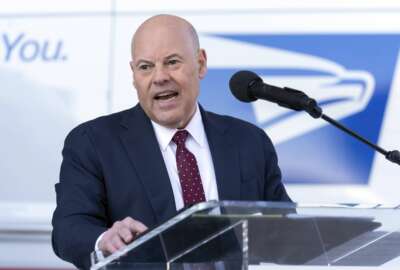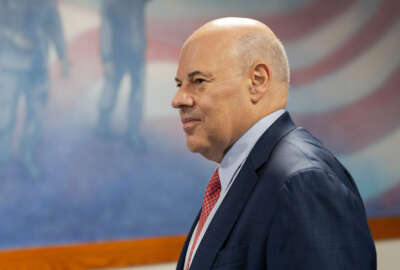USPS regulator defends probe into ‘far-reaching’ network shakeup
“The Postal Service's strategic plan has the potential to help its operations and revenues, but how well the plan is implemented will affect how much help it ...
A longtime member of the Postal Service’s regulatory body is defending a recent probe into sweeping network changes central to USPS’s 10-year reform plan.
Postmaster General Louis DeJoy has rebuffed the regulator’s public inquiry into USPS network modernization plans, telling lawmakers that the probe will “put this whole plan in jeopardy.”
But Robert Taub, President Joe Biden’s nominee to serve a third term at the Postal Regulatory Commission, said the commission is well within its jurisdiction to oversee the Postal Service’s “most far-reaching plan” in recent history.
“If one listens to some of the Postal Service’s information on this, it may be the most fundamental change to the network since Ben Franklin was postmaster general. And so this is not a time for the commission to think big thoughts or step back,” Taub told members of the Senate Homeland Security and Governmental Affairs Committee in a confirmation hearing Thursday.
Taub told senators the PRC hasn’t done “anything to stop, alter [or] change” the trajectory of USPS’s 10-year reform plan.
“The need for a strong postal regulator has never been more critical,” Taub added.
DeJoy, in an exclusive interview in July, said USPS was putting up with “nonsense” from the PRC’s public inquiry, and that the probe would draw out some of the agency’s most urgent reforms as it tries to turn around its long-term financial losses.
“Who is the Postal Service going after on this whole thing?” DeJoy said. “We’re committed to the service standards, we don’t need to be babysat.”
USPS, as part of its network modernization plans, is bringing mail processing and mail delivery operations all under one roof by establishing large facilities called Sorting and Delivery Centers (S&DCs). The agency will relocate letter carriers who previously worked out of “spoke” post offices to S&DCs, which will serve as the “hub” of regional mail operations.
USPS said it won’t lay off any of its employees as part of its S&DC plans. But Taub said this shakeup of the postal network will have huge impacts on cost, revenue, the USPS workforce and its customers.
Taub added that the PRC isn’t overstepping its authority, and that “we’re the regulator, not the operator” of the Postal Service.
“All we’re simply doing is opening up an opportunity for us to get more information on this operational plan,” Taub said. “I’d be more concerned if we had an operator who says we’re the best thing since sliced bread, because I think then we’re not doing our job. There’s a natural tension between the regulator and the operator. But I can assure you, the commission is not interested in getting on the workroom floor, being the operator.”
Members of the committee praised the PRC for shedding light on the USPS network changes. Committee Chairman Gary Peters (D-Mich.) urged the commission to serve as a “strong regulator, including taking proactive action” on USPS’s reform plans.
“The PRC’s oversight work here is absolutely essential. We must ensure that any Postal Service changes will not have any negative impact on the services that they provide and the customers that they serve,” Peters said.
Sen. James Lankford (R-Okla.) questioned the benefit of USPS butting heads with its regulator, especially with the agency’s deepening financial losses this fiscal year.
“There seems to be a battle back and forth between the postmaster [general] and between the [Postal] Regulatory Commission,” Lankford said. “With the Postal Service in such great debt right now, and accelerating on it, we’ve got to have the Postmaster General and all that’s going on with the Postal Regulatory Commission actually pulling the wagon in the same direction at some point.”
USPS is reporting a $5.8 billion net loss so far for fiscal 2023, and will not reach the “break-even” target envisioned in the 10-year plan. Taub said it’s “very disconcerting” that USPS still is seeing these sustained losses, despite Congress passing the Postal Service Reform Act last year.
“Certainly, inflation is some of it. And it’s not quite clear what else is driving it,” Taub said. “That’s part of our role, is to shine some spotlight, to try to get to some root causes.”
The PRC gave USPS the flexibility to set mail rates higher than the rate of inflation in late 2020, when the COVID-19 pandemic put the agency on the verge of running out of cash.
USPS has made regular use of this pricing freedom, and has fallen into a routine of setting biannual price hikes for its monopoly mail products.
But DeJoy has repeatedly said the PRC should have granted this pricing flexibility years prior, and blames some USPS’s long-term financial woes on the regulator not acting sooner.
Taub said the PRC is planning to conduct another comprehensive review of the USPS rate-setting plan in the coming years. The commission is legally required to review the USPS rate-setting system every 10 years.
By law, the commission needs to weigh nine criteria when making changes to USPS’s ability to set prices – among them, affordability, financial sustainability and the ability of USPS to meet its standards for on-time delivery.
Taub said that the commission is accepting public feedback on whether the regulator should institute a “mechanism to recognize when service is not being achieved, and maybe ratchet back the rate authority if service isn’t achieved.”
Taub added that the PRC is “trying to get ahead of the curve, and not wait for this review to start in two years.”
The commission, in its most recent report, found USPS wasn’t meeting nearly half of its service performance standards for its monopoly mail products.
While DeJoy has questioned the need for USPS to have a regulator, Taub said the PRC can help ensure DeJoy’s 10-year reform plan remains on track and capable of delivering the financial turnaround it promises.
“The Postal Service’s strategic plan has the potential to help its operations and revenues, but how well the plan is implemented will affect how much help it provides. The important task of improving the financial condition of the Postal Service remains daunting.”
The Government Accountability Office, in a recent report, recommended USPS can do more to ensure its 10-year reform plan succeeds — although the agency may need more than its own self-help strategy to dig itself out of a financial hole.
Taub has served on the commission since 2011, and was its chairman from December 2014 to January 2021.
As a lead House staffer, Taub helped craft the 2006 postal reform law that transformed the “relatively weak” Postal Rate Commission into the Postal Regulatory Commission. He also was a senior policy analyst for GAO.
“That task of providing transparency and accountability to the United States Postal Service is the key mission of why the Postal Regulatory Commission exists and was created,” Taub said.
Copyright © 2024 Federal News Network. All rights reserved. This website is not intended for users located within the European Economic Area.
Jory Heckman is a reporter at Federal News Network covering U.S. Postal Service, IRS, big data and technology issues.
Follow @jheckmanWFED





